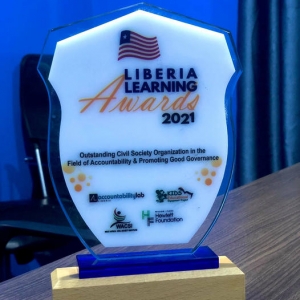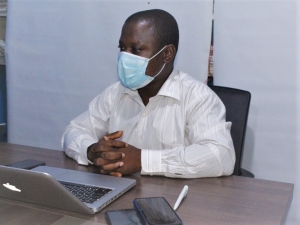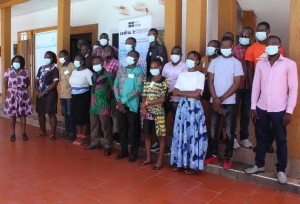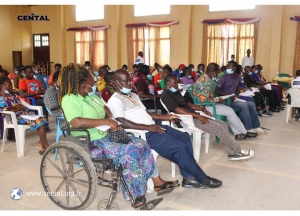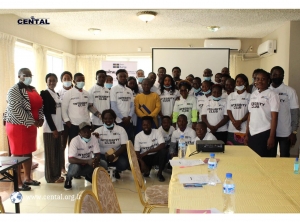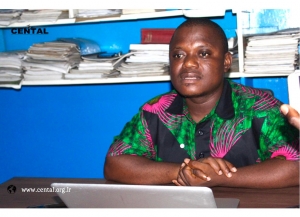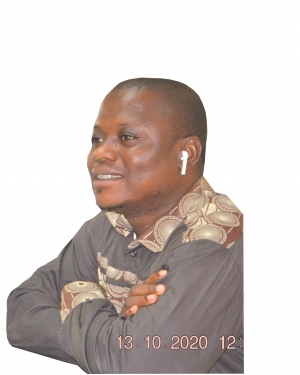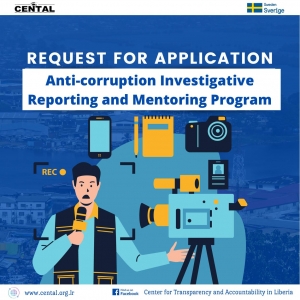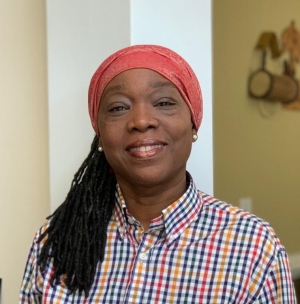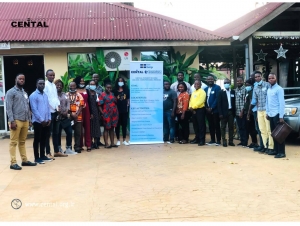CENTAL Wins Outstanding CSO In Accountability & Good Governance Promotion Award
Press Statement for Immediate Release
Press Statement for Immediate Release
July 12, 2021
Message to the African Union (AU) and Member States in Commemoration of the 2021 African Anti-corruption Day on the theme: “Regional Economic Communities: Critical Actors in the Implementation of the African Union Convention on Preventing and Combating Corruption”.
Distinguished ladies and gentlemen of the Press, Fellow Liberians, and Development Partners
As you may be aware, The African Union Convention on Preventing and Combating Corruption (AUCPCC) was adopted in Maputo, Mozambique on 11 July 2003 and came into force in 2006. To date, the Convention has been ratified by 44 Member States of the African Union, including Liberia. Since the adoption of the Convention, African states have made significant efforts in the fight against corruption, including the establishment of national laws and the creation of anti-corruption agencies. However, major challenges still remain. In recognition of the vast progress that has been made and cognizant of the need to continually reflect on approaches to end corruption, the African Union designated 11 July as the African Anti-Corruption Day, just as December 9 is celebrated as International Anti-Corruption Day.
Thus, the African Union Commission and her specialized bodies, especially the African Union Advisory Board on Corruption (AUBC) have since been holding relevant activities and events to commemorate the day. The Commission is not mistaken in its decision, as Corruption remains the major hurdle to poverty reduction, sustainable and inclusive economic development, as well as peace and stability on the continent, especially in poor countries such as Liberia. In the words of the AU Commission, July 11 is meant to give prominence to the fight against corruption through the commemoration of the adoption of the AUCPCC as a mechanism for fighting corruption in Africa.
It must be reiterated that Liberia has signed and adopted the African Union Convention Against Corruption. Liberia ratified the Convention in 2007 and has since been an integral part of legal frameworks for fighting against corruption in the country, in addition to the UN Convention Against Corruption (UNCAC), Economic Community of West African States Protocol on Corruption, and Sustainable Development Goals, especially Goal 16.5.
Distinguished ladies and gentlemen of the Press, fellow Liberians, as an integral part of global and continental fights against corruption, Transparency International and her African Chapters, including the Center for Transparency and Accountability (CENTAL), join the AU Commission and other stakeholders in Commemorating July 11 as African Anti-Corruption Day. For some time now, the Transparency International movement has consistently reminded the AU Commission and her members states, the Liberian Government included, about their obligations and commitments to fostering a robust, inclusive, and dynamic fight against corruption – a fight that does not protect confidantes and cronies of the power-that-be, but impartially and timely investigates and prosecutes all corruption cases. Furthermore, we have been urging African Governments to move away from rhetoric to more tangible and impactful actions, including but not limited to strengthening anti-corruption legal frameworks, providing adequate financial and moral support to public integrity institutions, as well as increasing efforts to address immunity, ensuring that there are no untouchable individuals and groups in the fight against corruption. This is particularly true for Liberia that continues to struggle with addressing Impunity due to limited political will, weak implementation of laws and policies, and poorly funded public integrity institutions such as the Liberia Anti-Corruption Commission, General Auditing Commission, and Public Procurement and Concession Commission, and Liberia Extractives Industries Transparency Initiative.
As the African Union Commission celebrates another July 11 (African Anti-Corruption Day), on behalf of Transparency International Secretariat and the 28 African Chapters, the Center for Transparency and Accountability in Liberia is pleased to inform the public about a 21-count letter to the AU Commission and her Member States. Among other things, the 28 Chapters of Transparency International across all Africa’s Regional Economic Communities in Central, East, North, Southern and West Africa take the opportunity again to:
- Applaud the African Union (AU) for earmarking 11 July as African Anti-Corruption Day and welcome this year’s theme: “Regional Economic Communities: Critical Actors in Implementing the African Union Convention on Preventing and Combatting Corruption.”
- Commend the 44 Member States of the African Union that have ratified the African Union Convention on Preventing and Combatting Corruption and implore the remaining 11 Member States to take measures to ratify this important Convention.
- Further commend the 34 Member States of the African Union that have ratified the African Charter on Democracy, Elections and Governance, and implore the remaining 21 Member States to take swift measures to ratify this important African Treaty.
- Recognise that by ratifying these treaties, African countries reinforce their commitment to democracy, human rights, and the rule of law, as well as to the underlying values of transparency, integrity, participation, and accountability.
- Note with great concern that corruption is and remains a significant threat and hindrance to African States, particularly in establishing democratic institutions and attaining sustainable development goals.
- Remind African leaders that the AUCPCC through Article 12(2) requires States Parties to ensure and provide for the full participation of civil society in the monitoring process and consult civil society in the implementation of the Convention.
- Further note that the impact of corruption on the continent’s economic development remains deep and visible and cannot be underestimated. Also note that corruption is not a victimless crime and often affects those who suffer most – vulnerable, poor, and marginalised individuals.
- Urge State Parties to ensure that they fully implement commitments they have undertaken by ratifying these treaties. Many States Parties are yet to put in place mechanisms for whistle-blower protection despite committing to adopting measures to protect informants, witnesses of corruption and related offenses, and protection of citizens from acts of reprisal.
- Further Urge States Parties to the AUCPCC to take swift action to report their progress on the implementation of the AUCPCC as required by Article 22(7) of the Convention. Appreciate the efforts of the very few States that have so far reported.
- Reiterate the AUCPCC’s provision for States Parties to create an enabling environment for civil society and the media to hold governments to the highest levels of transparency and accountability in the management of public affairs.
- Remind the African Union leaders of our call in 2018 for the African Union to,
- Develop or endorse minimum standards and guidelines for transparent and accountable procurement.
- Set up and implement a community of practice dedicated to transparent and accountable procurement and the pursuit of value for money.
- Dedicate resources to procurement training and monitoring.
- Invest in research on the practice of procurement within Africa and continually and publicly monitor progress towards implementation of the minimum standards agreed.
- Recognise that the Open Contracting Data Standard (OCDS) and the Open Contracting Principles - established in 2014 - help facilitate the standardised disclosure of data, clarify documents applicable to the contracting process and allow for deeper and better analysis of data; and therefore remind AU leaders of our call in 2018 for the AU to:
- Encourage and facilitate Member States to join open government processes and introduce open contracting through the adoption of the OCDS and Open Contracting Principles in all sectors.
- Introduce open contracting as the default procurement process of the AU.
- Highly commend the AU leadership in endorsing, promoting and following up on the Common African Position on Assets Recovery (CAPAR).
- Entreat African States to address corruption in service delivery in education, water, judicial and health systems, including in crisis situations such as the Covid-19 pandemic, and remind leaders of our 2018 call the AU to:
- Promote transparency and accountability in education, health, water sector and justice systems, ensure sanctions and end impunity for those convicted of corrupt practices.
- Create mechanisms to collect citizens’ complaints and strengthen whistleblower protection.
- Remind African leaders of our 2016 call on governments to disclose beneficial ownership as a way of ending the secrecy that enables corruption; and our 2018 call on governments to:
- Publish timelines for establishing public registers, in open data format, containing beneficial ownership information.
- Ensure that foreign companies operating in Africa are registered and disclose their beneficial owners.
- Require bidders for public contracts to undergo due diligence procedures to verify the background of the company and its senior officers, majority shareholders and ultimate beneficial owners, as well as disclose the identity of beneficial owners.
- Require high-risk sectors, such as the real estate industry, to have anti-money laundering programme requirements, including customer due diligence and adequate record keeping.
- Ensure there are appropriate sanctions proportionate to the misconduct, including criminal prosecutions, for those found guilty of breaching these and related laws, and those found making false declarations.
- Urge African States to step up measures against money laundering and the financing of terrorism. Call on African leaders to ensure:
- that mechanisms are in place to allow all the relevant persons and entities to comply with their obligation to report suspicious transactions,
- that information on anti-money laundering and financing of terrorism is exchanged among the relevant bodies at regional level.
- the restructuring, adequate resourcing and capacity-building of investigative and prosecuting authorities on money laundering and financing of terrorism
- that each State Party conducts a national money laundering risk assessment and puts in place the necessary response measures.
- Highlight the importance of the Extractives sector in growing and sustaining Africa’s economies and placing countries on a recovery path against the poor economic performance occasioned by COVID-19. Urge Member States to require transparency and accountability in the mining sector including the publication of reports on agreements, public participation, publishing information on operations of mining companies including on joint venture payments. Also remind Member States of commitments to the Africa Mining Vision and the Extractives Industry Transparency Initiative (EITI).
- Flag the urgent need for prudent public debt management in light of the borrowing related to Covid-19, and the impact of COVID-19 on African economies and recovery and call on Member States to put in place efficient systems for transparency and accountability in the acquisition of public debt, use and retirement.
- Stand with all communities, families and people facing the dreadful impacts of the Covid-19 pandemic and welcome all efforts to alleviate this situation. Urge African leaders to
- Ensure transparency in vaccine acquisition and distribution and ensure vaccine equity. Remind African leaders that Africa is already lagging behind in vaccination and that transparency is critical in ensuring target populations especially vulnerable groups get vaccinated.
- Ensure transparent and accountable procurement in the management of COVID-19 pandemic and make publicly available Beneficial Ownership information of companies winning COVID 19 tenders.
- Reaffirm our commitment to work with the African Union through the distinguished African Union Advisory Board on Corruption, the African Governance Architecture and other Organs related thereto, and most especially work with the anti-corruption agencies in our various Member States to eliminate corruption from the daily lives of African citizens.
- Convey the assurances of our highest consideration.
“Added Knowledge and Glorious Opportunity” …Participants Describe Anti-Corruption, Integrity Training
Monrovia, Friday, May 14, 2021- Participants at a two-day workshop to train and mentor journalists on Anti-Corruption and Integrity-related Investigative reporting have described the training as an added knowledge and a glorious opportunity for them to explore different angles of developments within the country.
The training, which was organized by the Center for Transparency and Accountability in Liberia (CENTAL) with support from the Government and people of Sweden through the Swedish International Development Cooperation (SIDA), seeks to empower journalists with the knowhow to investigate and independently report on corruption and integrity issues in Liberia.
“Let’s utilize the skill acquired here over the last two days to go beyond the ordinary and dig deeper to get the real stories out. This is an added knowledge that we need to take advantage of to enhance our works,” said Hannah N. Geterminah of the Daily Observer Newspaper at the close of the training held at the John Gbedze Beach Resort in Marshall City, Margibi County from May 10 - 11, 2021.
The training brought together twenty (20) journalists from ten (10) counties – Montserrado, Margibi, Bong, Nimba, Bomi, Grand Cape Mount, Gbarpolu, Lofa, Grand Bassa, and Rivercess.
“This training is an eye-opener for us, especially on how to track public funds whether in the public or private sector. We also see this as an opportunity for us to go the extra mile in distinguishing projects funded by either County Development Fund (CDF), Social Development Fund (CSDF) and Legislative Support Projects (LSPs) as well as private projects,” remarked Abraham Morris of The In-profile Daily Newspaper. Morris thanked CENTAL for affording them the opportunity to further explore their full potentials.
NIBA is a three and half-year program that seeks to amongst other things, empower citizens with relevant pieces of information to demand for and take action against corruption in Liberia.
The program is being implemented in seven counties - Montserrado, Bong, Nimba, Bomi, Gbarpolu, Grand Bassa, and Rivercess.
During the opening, the Executive Director of CENTAL Anderson D. Miamen presented the overview of the NIBA Program, followed by Madam Maureen Sieh, lead facilitator of the training who presented on journalists’ role in reporting on accountability and transparency in Liberia as well as CENTAL’s Advocacy and Legal Advice Center (ALAC) on the work of the ALAC program.
The Liberia Anti-Corruption Commission (LACC), represented by its acting Executive Director, Moses Kowo, delivered a presentation that guided journalists on what to look out for in investigating and reporting Corruption matters, frameworks in the fight against Corruption, and how journalists can use integrity institutions to inform their reporting on accountability and transparency amongst others. For his part, Mr. Frank Sainworla, a media trainer and publisher, News Public Trust Newspaper presented on the topic, the Freedom of Information (FOI) as a tool to promote transparency and accountability. CENTAL’s Gender Officer, Akiah Precious Glay presented on Gender and Corruption: A Heavy Burden on Social Inclusion in Society while the Program Manager, while Gerald D. Yeakula presented on, ‘Reporting on Accountability and Transparency of the County and Social Development Fund: Lessons learned from engagement on the proposed standalone County and Social Development Fund Law.
CENTAL Ends Open Expenditure Forums In Bong & Nimba
Monrovia, Saturday, April 10, 2021 - The Center for Transparency and Accountability in Liberia (CENTAL) with support from the Government and people of Sweden through the Swedish International Development Cooperation Agency (SIDA) has successfully concluded the first two (2) in a series of seven (7) Open Expenditure Forums expected to be held across seven (7) counties in Liberia.
The Open Expenditure Forums, separately held in Gbarnga, Bong County, and Sanniquellie, Nimba County were intended to increase citizens’ knowledge and understanding of public spending and make them aware of the importance of openness on societal growth and expansion as well as enhance accountability of public officials to their people.
The forums are being held under the auspices of CENTAL’s National Integrity Building and Anti-Corruption (NIBA) program which targets seven (7) counties: Bong, Nimba, Bassa, Rivercess, Bomi, Gbarpolu, and Montserrado.
At the initial two forums in Bong and Nimba Counties on April 6 and 7 respectively, citizens, including women, youth, students, people with disabilities, community members and leaders enthusiastically engaged and interacted with their local leaders, mainly Superintendents and Project Management Committees Chairpersons.
In Gbarnga, Bong County, the Protocol Officer in the Office of Superintendent Esther Walker spoke on her behalf. Mr. Daniel Dunoe welcomed the CENTAL team and pledged the County Authority’s willingness to working with CENTAL to promote openness in the county’s operations and expenditures.
The Chairman of the Bong County Project Management Committee (PMC), Stephen J. Mulbah, used the opportunity to provide detailed information regarding the County Social Development Fund and different projects being undertaken in the county. He said all of the corruptions and financial malpractices in the county are based on mere speculations and hearsays, as most of those who spread the false information have made no attempt to seek the right pieces of information due to political and other differences. He promised to immediately tender his resignation as Bong County PMC Chairman if anyone in the gathering proves that they were ever denied information on any activities/projects being undertaken in the county.
In Sanniquellie, Nimba County, the Assistant Superintendent for Development, Railey G. Myers, the PMC Chairman, Harris Y. Yeanamie and Sanniquellie City Mayor, Miama M. Kamara and other officials were in attendance. The Assistant Superintendent for Development welcomed the CENTAL team and noted that the county authorities have always been opened in steering the affairs of the county and expressed willingness to working CENTAL and other organizations working to promote transparency and accountability in the County and the Country at large. Delivering his presentation, the Chairman of the Project Management Committee, Harris Y. Yeanamie, informed citizens about those who are signatories to the county’s account and provided a detailed description of procurement processes followed for payments.
He used the time to provide detailed information to the people about different projects being implemented, completed, and those yet to get started across the county. Chairman Yeanamie also expressed profound appreciation to CENTAL for convening the Open Expenditure Forum in the county, as it will help to clear most of the doubts and speculations amongst the people about management and implementation of project in the county. The Nimba County PMC Chairman presented on the topic: ‘Nimba County Development and Social Funds.’
The Open Expenditure Forum is built on existing efforts of the Center for Transparency and Accountability in Liberia (CENTAL) in collaboration with stakeholders at all county levels including but not limited to, superintendents, representatives, senators, civil society organizations, women, youths, students and other marginalized groups, street vendors, among others.
The people were excited to have had such an opportunity to access and engage with their local leaders in a face-to-face engagement to get instant feedback to their concerns and clarity to their doubts. CENTAL’s Gender Officer, Akiah Precious Glay gave the overview of the Open Expenditure Forums while Atty. Gerald D. Yeakula, Program Manager of CENTAL presented on the topic: ‘Budget Transparency and County Development.’
With support from the Government and people of Sweden through the Swedish International Development Cooperation Agency (SIDA), CENTAL’s NIBA program is rolling out Open Expenditure Forums across seven (7) counties - Bong, Nimba, Bassa, Rivercess, Bomi, Gnarpolu and Montserrado.
It seeks to enhance dialogue and partnerships between citizens and their leaders and well improve relationships between county officials and citizens for smooth project implementation. The NIBA program is a three-year program that seeks to among other things, provide citizens access to relevant pieces of information to demand for and take action against corruption in Liberia.
CENTAL Trains Over 40 University Students …To Increase Capacity in Anti-Corruption and Awareness Raising
Monrovia, Thursday, March 25, 2021 -The Center for Transparency and Accountability in Liberia (CENTAL), through its youth engagement and Integrity Club (iClub) Program, has concluded a one-day intensive training for over forty (40) university students. The training seeks to increase the students’ knowledge and understanding of pertinent issues related to the fight against corruption and integrity building, especially in Liberia; and sets the basis for those trained to engage in outreach activities in their respective universities, high schools, and communities. The students were recruited from the University of Liberia (UL), United Methodist University (UMU), African Methodist Episcopal University (AMEU), and the Stella Maris Polytechnic University (SMPU).
Speaking at the opening of the one-day training workshop in Monrovia, CENTAL’s Executive Director Anderson D. Miamen told the students to brace themselves for the task of engaging their peers and community members through awareness-raising about corruption, integrity building, and other related issues in the country. Director Miamen said, over the years, the fight against corruption did not considerably take into account the direct involvement of students and youths to engage their peers and community members about corruption and its manifestations in schools, public and private sectors, communities, and homes, but has been skewed mainly towards high-level efforts such as prosecution, enactment of laws, amongst others. He indicated that the I-Club presents an opportunity for young people to get actively involved in the fight against corruption and contribute to positive change.
The CENTAL boss told the participating students to take advantage of the training and use it as a means of networking and building relationships that can be leveraged to enhance anti-corruption and integrity building efforts in Liberia. He pledged CENTAL’s fullest commitment to the fight against corruption and support to the work of the IClubs and their members who will be agents of positive change in their respective universities, communities, and the society at large.
Speaking earlier, the Dean of Student Services at AMEU, Mr. Abraham Bility said the involvement of university students in the fight against corruption and integrity building efforts now sets the stage to accelerate the discourse to another level. Dean Bility said the concept of integrity building at the university, high schools, and community levels will prepare the country for an inclusive anti-corruption effort. “This country needs you more than you need it. Beware that, as volunteers of your respective IClubs, you will be challenged by friends. Even faculties will despise you, but remain focused,” Dean Bility said. He lauded CENTAL for the initiative and pledged AMEU’s fullest support to the work of the IClub at the university and beyond.
The training covered various topics, including: “The role of Integrity in creating an enabling environment for youth empowerment and development in Liberia,” presented by Mamuna Kamara Waydon, Senior Policy Analyst at the Governance Commission (GC); “Understanding Corruption: Its Ramifications and Effects, Causes and Remedies,” presented by Zobon A. Kolenky, Head of Asset Declaration and Verification at the Liberia Anti-Corruption Commission (LACC); “Corruption trends in Gender and Corruption: Key Manifestations, Challenges and way forward with Women and Marginalized group in focus,” presented by Madam Akiah Precious Glay, Gender Officer at CENTAL; and “Investigation and Evidence Gathering in the Fight Against Corruption: Key Issues, Challenges, and Recommendations,” facilitated by Mr. Baba Boakai, Director for Enforcement at the Liberia Anti-Corruption Commission (LACC); “Awareness, Advocacy, and Communication strategies in the fight against Corruption,” presented by Anderson D. Miamen, Executive Director of CENTAL, among others.
Held at the Corina Hotel in Monrovia, the training workshop was held under the auspices of the National Integrity Building and Anti-Corruption (NIBA) program funded by the Government and People of Sweden through the Embassy of Sweden near Monrovia and the Swedish International Development Cooperation Agency (SIDA) now sets the basis for the students to begin raising awareness about corruption and integrity building at their respective universities, high schools, and communities.
CENTAL Wants Concrete Actions in LACC Corruption Saga and Wider Stakeholders’ Consultation in Making New Nominations at LACC
Thursday, March 04, 2021 - The Center for Transparency and Accountability in Liberia (CENTAL) expresses grave concern over recent allegations of corruption involving the Vice-Chairperson of the Liberia Anti-Corruption Commission (LACC), Cllr. Kanio Bai Gbala and Executive Director, Mohammed E. Fahnbulleh. Such allegations are extremely troubling and damaging to the image of an institution of Government leading the fight against the cancer of corruption in Liberia.
If the LACC must maintain its credibility as an entity of Government mandated to investigate and prosecute acts of corruption, as well as educate the public about the ills of corruption and the benefits of its eradication, the Commission and the Government of Liberia must do everything to ensure that the allegations are timely investigated to establish the truthfulness or falsity of the matter.
Ladies and gentlemen of the Press, upon learning of the LACC corruption saga, CENTAL reached out to the Commission to inquire about claims and counterclaims raised by the parties including, but not limited to, unlawful salary payments, unaccountability of cash advances received, purchase of Government property, amongst others.
Also, we reached out to the United Nations Development Programme (UNDP) to get clarity on the date and other facts regarding the resignation of Cllr. Kanio Bai Gbala, who is alleged to have been within their employ while simultaneously being paid by the Liberia Anti-Corruption Corruption, during the latter part of 2019. We wish to inform the public that we have received positive feedback from these institutions. Both the LACC and UNDP have launched separate investigations to establish the facts, which we hope will be timely communicated to the public.
However, while we welcome the LACC’s internal investigation, we strongly believe that such grave allegations involving senior officials of the Commission cannot be left to the institution alone to investigate.
Therefore, we call on President George Manneh Weah to constitute an independent committee to timely investigate the matter and inform the public about its outcomes. If not timely and properly investigated and the recommendations fully implemented, these allegations may detract from the goodwill anti-corruption institutions have received from the public over the years, including dampening public confidence in the country’s leading anti-corruption institution.
Distinguished ladies and gentlemen of the Press, fellow Liberians, in the wake of the resignation of its former chairperson, Cllr. Ndubuisi Nwabudike, currently, the Liberia Anti-Corruption Commission has an all-male Board of Commissioners, thus falling short of the gender sensitivity provided for in section six (6) of the LACC Act. With all three (3) Commissioners being males, the need for ensuring gender mainstreaming at the highest level of the Commission cannot be overly emphasized.
Also, given that the LACC has been in the media for all the wrong reasons lately, especially claims and counterclaims about the citizenship and credibility of the immediate past chairperson and allegations of corruption involving its vice-chairperson, in the spirit of collaboration and partnership, as provided for in section 6.2 of the LACC Act, CENTAL urges President George Manneh Weah to widely consult with critical stakeholders (civil society and development partners) in making new nominations at the LACC.
And that qualified females should be strongly considered in such appointments to avoid an all-male and gender-biased Board of Commissioners, in violation of section 6.3 of the 2008 LACC Act. In part, the above will help to increase public confidence in and support for the leadership and work of the Commission. Also, they will somehow satisfy minimum requirements for making key appointments at anti-corruption and integrity institutions whose leaderships and key staff must be independent as well as enjoy the full confidence and support of the public.
To conclude, CENTAL reassures the public of her commitment to the fight against corruption and call on citizens to remain constructively engaged in demanding for and taking actions against corruption in Liberia. Also, we reiterate the call for a sincere, genuine, and impartial fight against corruption in the country.
CENTAL Welcomes Supreme Court’s Ruling in Samukai Case; Calls for Speedy Determination of Corruption Cases
Press Statement for Immediate Release
Wednesday, February 10, 2021
Ladies and Gentlemen of the Press, the Center for Transparency and Accountability in Liberia (CENTAL) expresses delight over the Supreme Court ruling affirming the judgment of the First Judicial Circuit Court Criminal Assizes “C” in the case Republic of Liberia v. J. Brownie Samukai et al, holding the Defendants guilty of the crimes of Theft of Property, Criminal Conspiracy, and Misuse of Public Money in respect of funds contributed by men and women of the Armed Forces of Liberia (AFL) towards the AFL Pension Fund.
Members of the Press, fellow citizens, one and all, while we hold that the Court missed an opportunity to call corruption by its name, we are however optimistic about the decision of the Court for the following reasons:
- The Court’s unambiguous exposition of key corruption issues, including its reference to “integrity” and the “universal principle of accountability”. We believe that the Court’s acknowledgment and elaboration of these concepts represent a significant step in mainstreaming the fight against corruption at the highest levels of society as well as entrenching integrity values.
- The Court’s admonition that public officials “must have legal reliance and a legal basis” for the fulfillment of both their “statutory responsibilities as laid down by statute” and their “special duties as commanded by the head of state/president”. Expanding on this point, the Court explained that a public official is required to perform and implement the commander-in-chief/President’s orders with public funds as budgeted by the government in accordance with the government budget process. We are of the opinion that this position by the Court presents a teaching moment to public officials who go to any lengths to endear themselves to the Presidency or any authorized individuals at the expense of our laws and public interest. We further agree with the Court that a Minister or Public Official receiving Presidential orders, whose obedience requires violation of an existing policy or law, has a duty to advise the President or cause the Minister of Justice to advise the President and “that if the President insists on the implementation of the illegal order, the Minister has the option to disobey the President and honorably resign his position with integrity.” While the ruling of the Court references the presidency due to the facts presented by the case under review, we strongly believe that it applies to other public officials and individuals taking instructions from their superiors. This, we believe, sends a very clear message that the utmost duty of public service is the state and its people and not the power-that-be.
We applaud the Court for its decision and further urge it to decide corruption cases with an even higher speed. Appeals to the Supreme Court has long been used to stifle justice, especially in corruption-related cases. The Court must therefore exert all efforts to ensure that cases are speedily determined according to the due process of law, ensuring that the rights of all accused persons are respected and protected.
Distinguished Ladies and Gentlemen of the Press, we would like to use this opportunity to also call on President George M. Weah to timely appoint the Executive Chairperson of the Liberia Anti-Corruption Commission, the government entity leading the fight against corruption in the country. We call for broad-based consultation with civil society, development partners, and other critical stakeholders in processes leading to the recruitment of the next LACC chairperson and officials of other public integrity institutions, including but not limited to the New Auditor General (AG) of the Republic of Liberia. Increased stakeholders’ confidence in those appointed or recruited to key positions of public trust, especially at anti-corruption and integrity institutions is essential to receiving the required moral and financial support as well as cooperation to effectively and efficiently perform.
To conclude, we reiterate our commitment to supporting the fight against corruption in Liberia and overall national integrity building efforts. Also, we call for strong collaboration and partnership between government and other stakeholders, especially ordinary citizens with critical roles in denouncing corruption, demanding accountability from their leaders, as well as providing moral support to public integrity institutions and other key anti-corruption actors.
Thanks.
Management
CENTAL To Mentor Investigative Journalists
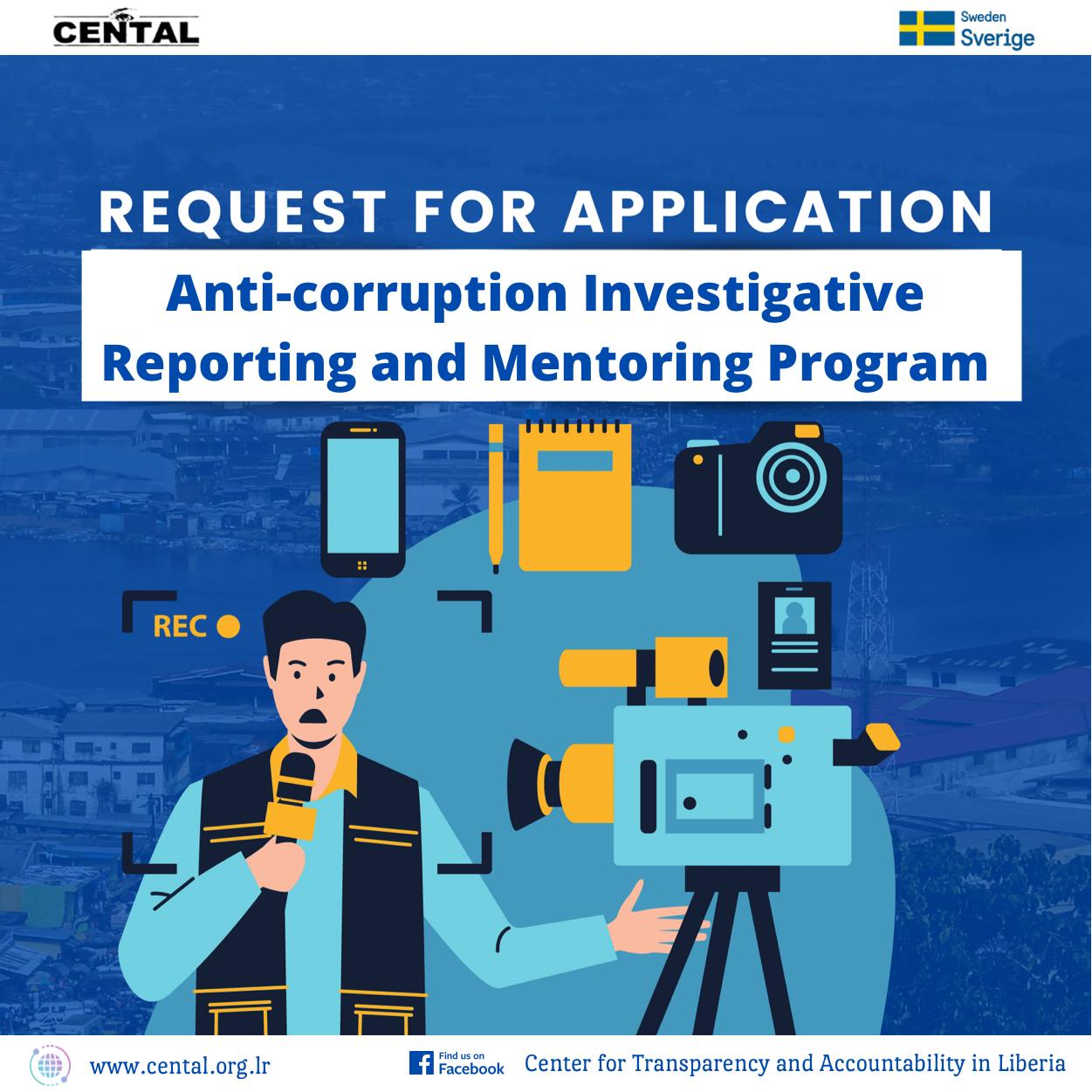
Phone: +231886474563/0770175162
Sara Beysolow Nyanti Becomes CENTAL Board Member
The Board of Directors of the Center for Transparency and Accountability in Liberia (CENTAL) has appointed Madam Sara Beysolow Nyanti, former UNICEF Resident Representative to the Republic of Yemen, as member.
In her letter of interest addressed to the Board of Directors of CENTAL in August 2020, Madam Nyanti congratulated the Board for work being done to increase accountability and transparency in governance and collaboration with stakeholders in fighting against corruption in the country.
“This is fundamental to good governance and ensuring the fulfillment of the rights of the people of Liberia. As a leader within the United Nations System who has pioneered groundbreaking work in strengthening risk management and fiduciary systems in the worst humanitarian situation in the world in Yemen, I relate very well with the task at hand for the Board Members of the Center for Transparency and Accountability in Liberia (CENTAL),” she said in the communication.
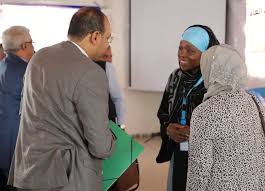
Madam Nyanti, second from right, was recently posted to Yemen as the Resident Representative of UNICEF.
Madam Nyanti who currently serves as UNICEF resident coordinator in the Republic of Nepal noted that, having contributed to the strengthening of systems for accountability and transparency around the world, she would like the opportunity to do the same here in Liberia through CENTAL. “With that, I herein express my interest in joining you to continue the great work that you all have been doing. I know that the global perspectives will add value to what you are doing; and take us further down the path of realizing the mission of CENTAL,” the high-ranking female UN Official stated.
Madam Sara Beysolow Nyanti holds a Master’s degree in Public Administration and is a Globally accredited Partnership Broker with the Partnership Broker Association, UK. She is the highest ranking Liberian in the United Nations since 2019 with a grade of D2.
Madam Nyanti served in the following capacities over the last 20 years: UNICEF Resident Representative to the Republic of Yemen, February 2019 to July 31, 2020; UNICEF/World Bank Team Leader, Emergency Cash Transfer for 9million Yemenis, 2017 –2019; UNICEF Resident Representative to the Islamic Republic of The Gambia, 2015 –2017; UNICEF Head of Office in Lagos, Nigeria, 2010 – 2015; UNICEF HIV/AIDS Advisor to the Representative in Namibia, Kenya, 2009 – 2010; UNICEF Chief of HIV/AIDS Section in Nepal, 2007 – 2009; UNDP International Program Manager, Nepal, 2005 – 2006; UNDP Program Analyst/Global Fund Program Manager in Liberia, 2003 – 2005 and Government of Liberia, Director, National AIDS Control Program, 1999 – 2003.
Established in 2004, CENTAL is a membership-based civil society organization that fights corruption and promotes integrity in public and private life through programs that target positive change in attitudes, behavior, and practices. It is the national chapter of Transparency International, the global civil society organization leading the fight against corruption.
CENTAL Ends Strategic Planning Retreat
CENTAL Ends Strategic Planning Retreat
The Center for Transparency and Accountability in Liberia (CENTAL) has completed a two-day retreat aimed at reviewing the successes and challenges experienced by the Organization in 2020 and to strategically plan for the improvement of its overall performance in the New Year. Held at the Tropicana Beach and Resort from January 7 to 8, the event was intended to reflect on and review lessons learned from 2020; enhance staffs’ capacity in project design and implementation; increase internal coordination, information sharing and collaboration; as well as to equip staffs with the needed document and tools for timely reporting.
During closing ceremonies, staffs of the Organization were lauded for their commitment to serve their country through CENTAL over the years and encouraged to work even harder for the building of integrity and the promotion of transparency and accountability across all sectors of the country. CENTAL Board Chairman, Cllr. T. Negbalee Warner, said the retreat was necessary to allow the Organization plan properly to effectively and efficiently execute the task of fighting corruption and bad governance in Liberia.
Cllr. Warner stated that continuous capacity building remains very critical to the survival as well as enhancement of productivity, efficiency and growth of the Organization. He said making Liberia better and a corruption free nation requires the honest effort of everyone including staffs of CENTAL who have signed off to a pledge of fighting the menace of corruption and to build a culture of transparency and accountability in Liberia.
Cllr. Warner , who is also Dean of the Louis Arthur Grimes School of Law at the University of Liberia, lauded the Management of CENTAL through its Executive Director, Anderson D. Miamen for the exceptional leadership role in leading the Organization in the right trajectory over the years.
For his part, Director Miamen lauded the staff for the level of commitment and dedication shown over time as well as their expressed willingness to always acquire new skills for the improvement of their individual capacity as well as the operational capacity of the Organization.
He told staffs to return to their respective places of assignment with renewed dynamism and further commitment to achieving the organization’s targets for 2021. Also speaking, the Program Manager of CENTAL, Gerald D. Yeakula thanked the County Field Officers (CFOs) for attending the retreat despite short notice. He said that the participation of the CFOs is a demonstration of their commitment to the organization and rallied them to remain diligent in the performance of their duties.
The retreat brought together CENTAL’s central office staffs and CFOs from seven counties: Montserrado, Bong, Nimba, Grand Bassa, Rivercess, Gbarpolu and Bomi. The retreat was held under the theme: “Reflecting and Planning for Greater Impact.” With funding from the Government and people of Sweden through the Swedish International Development Corporation Agency (SIDA), CENTAL is currently implementing a three-year National Integrity Building and Anti-Corruption (NIBA) Program in seven counties: Montserrado, Bong, Nimba, Grand Bassa, Rivercess, Gbarpolu and Bomi.
LOCATION
22nd Street, Sinkor
Tubman Boulevard
Monrovia, Liberia
Phone: +231 88 681 8855
Email: info@cental.org.lr
Website: www.cental.org.lr
SUBSCRIBE
Get updates and important events straight to your inbox. We don't spam

